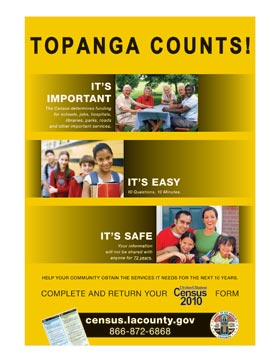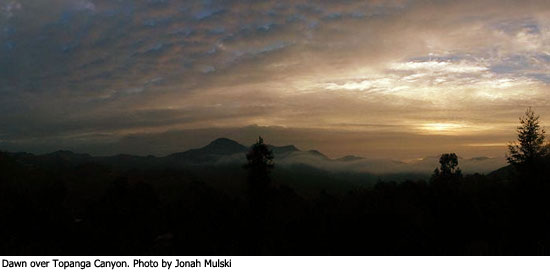Selling the census in Topanga
March 4, 2010
Ranging along a rippling creek and up rugged hillsides, the community of Topanga Canyon stands as a unique rural enclave of 9,000, just miles from the urban edge of Los Angeles.
For decades, artists, musicians and nature lovers have lived together in the woodsy, bohemian community with a quirky independence. Residents treasure the natural beauty, a do-it-ourselves community spirit and a deep sense of privacy.
Maybe just a little too much privacy, as far as the U.S. Census is concerned.
 Topanga has been designated a “hard to count” area—one of 22 unincorporated L.A. County communities being targeted for a special effort to make sure that every man, woman and child is accounted for when the census forms go out this month.
Topanga has been designated a “hard to count” area—one of 22 unincorporated L.A. County communities being targeted for a special effort to make sure that every man, woman and child is accounted for when the census forms go out this month.
Educated and for the most part prosperous, Topanga might seem a surprising choice for the designation. Other areas that made the county’s “hard to count” list are places like Willowbrook and East Los Angeles, where poverty, transience, unemployment, language barriers and low levels of education can present traditional obstacles to accurate census counts.
But those who know the Topanga region well say that just getting the word out in this diffuse, rural community of winding lanes and properties with multiple structures can be difficult, especially among the elderly. And, of course, landlords might not be eager to disclose on a census form the existence of any extra residents on their properties.
Perhaps the biggest challenge is overcoming a hardy strain of homegrown canyon skepticism about handing over personal data to Uncle Sam in the first place. “There are people who are fearful that their information might be used indiscriminately by government offices,” says Marge Santos of the county CEO’s office, who is the “complete count committee” chair for unincorporated areas.
Some are concerned that individual household data might find its way to tax agencies, or be subject to “data mining” in the private sector or even identity theft.
So with privacy concerns on a collision course with the need to get a good count to ensure a host of civic benefits, public officials and local community activists are banding together in a campaign called “Topanga Counts!”
And to do that requires the ability to speak fluent Topangan.
“We’ve got to relate the Census directly to Topangans, to tell people what it’s going to mean in Topanga terms,” says Stacy Sledge, president of the Topanga Town Council, a volunteer group that links the community to the county government and is helping the Topanga Counts! efforts.
That means a publicity and communications campaign that includes not only posters, banners, e-mail blasts and newspaper ads but also stationing a U.S. Census outreach worker in a local building that houses the Historical Society.
And it means that Topanga Elementary Charter School principal Liam Joyce is leading a month-long effort to motivate parents to fill out census forms by hitting the parents’ most influential friends: their kids.
None of this is an idle exercise in trying to drum up civic pride. The 10-year tally of all Americans mandated in the U.S. Constitution becomes the baseline for demographic and political decision-making, from laying district boundaries for Congress and state and local offices to apportioning funding for a host of vital public services.
This year’s questionnaire is a streamlined, 10-question form that will be easier to fill out than ever, as the county’s new census website explains.
To allay community suspicions, census officials point out the data gathered is relatively innocuous – less than the typical online credit card purchase. The listed information doesn’t go much beyond name, gender, ethnicity, age and telephone number and number and relationship of people in the household.
To further help defuse criticism based on fears of questioning, the group is running ads in the local newspaper, the Topanga Messenger.
An ad that will run this week, headlined “Topangans Watch Your Mailbox,” is a blow-up of the one-page form designed to show residents exactly how simple and non-threatening the actual questions are.
A recent ad featured a letter from Supervisor Zev Yaroslavsky linking accurate census data to increased financial benefits such as funding for schools, libraries, transportation and disaster first- responders. The letter stressed that “no personal identification such as DMV records, Social Security or other financial information will be requested. All data is confidential.”
As for landlords with extra units, Marge Santos says she has heard from some who are torn over whether to participate in the census. “They wanted to make sure the person in the back gets counted,” she says, “but they wanted to know whether they were going to be penalized.”
If the rental unit doesn’t have a separate mailing address, the homeowner should list the renters as residents, Santos says. She emphasized that these homeowners should not be fearful because census information on extra tenants is confidential and will not be shared with other agencies.
Overcoming philosophical and political objections may be a tougher sell. Many residents vigorously opposed the federal Patriot Act as too intrusive, Sledge points out, and suspicions linger.
Privacy concerns led Topanga Town Council vice president Rebecca Goldfarb to closely question outreach workers at recent community meetings. Saying that she had qualms about answering some questions, she asked officials about whether partially completed forms can count. “I do understand the value and great importance of the census,” says Goldfarb, a wills and trusts attorney, “but I think many people in Topanga are concerned about the kind of information that is being solicited.”
Posted 3/4/10













 405 bridge work causes a stink
405 bridge work causes a stink
